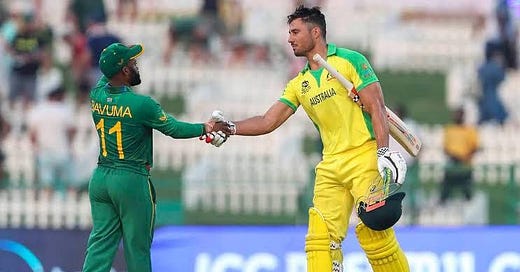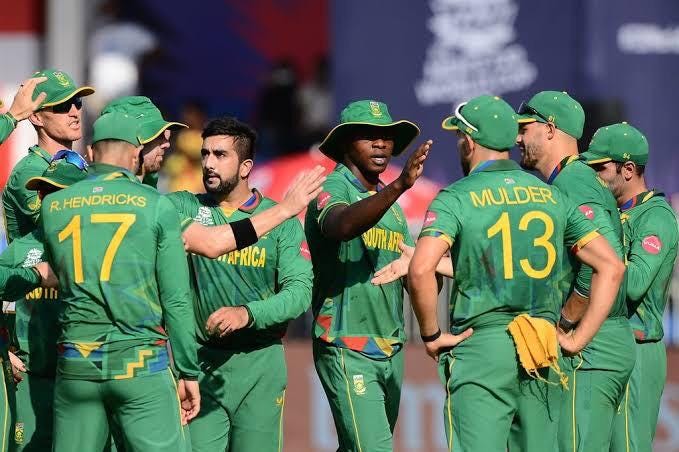The ‘moment’ has passed. The Proteas squad has been home for almost a week and attention has moved to the next challenge, Netherlands and India. Cricket South Africa even issued a statement of ‘congratulations’ to Temba Bavuma and his squad. But the itch hasn’t been adequately or sufficiently scratched.
Finishing level on points with England and Australia but missing out on a semi-final place at the T20 World Cup because their net run rate was inferior. Frustrating. In previous tournaments the first criterion for separating teams in such circumstances was the head-to-head result between them. In which case the Proteas’ loss to Australia in the opening game would have eliminated them.
The ICC is basically just an events-organising body these days so it’s a good job they do them well. They felt the criterion might be unfair, punishing a team for one bad day at the office when they might be playing some of the best cricket. By introducing net run-rate as the primary eliminator, teams were given a chance to ‘manage’ that aspect of their fate throughout all of the other group matches.
Tournament organisers (and broadcasters) were also of the view that it would eliminate, or at least reduce, the number of games which dawdle to an inevitable result with the batting team using most of their 20 overs chasing a modest total. The commercial people who sell the ‘product’ don’t like that. Neither do the rest of us, for that matter.
Most of you will know them, but let’s do the numbers – for those who don’t. If the Proteas had chased down in 7.5 overs the 85 they needed to beat Bangladesh, they would have been in the semi-finals instead of Australia. Of course, Australia might have had the chance to tweak things again to improve their own net run-rate so the statistical hindsight is far from perfect or definitive. But it’s not far off.
Before the Bangladesh match South Africa’s net run-rate was significantly superior to Australia’s so perhaps they believed it wasn’t necessary to bat as quickly as possible to complete an inevitable victory. They might also say it was impossible to foresee what would happen when Australia played Bangldesh a few days later.
Really? Having bowled Bangladesh out for just 84 themselves, what were the chances of an attack featuring Mitchell Starc, Josh Hazlewood, Pat Cummins and Adam Zampa doing likewise? Even better, as it transpired. They bowled them out for 73 and chased the runs down in an eye-watering 6.2 overs in the knowledge that doing so within 7.4 would put them ahead of the Proteas. Captain Aaron Finch smashed 40 from 20 balls.
They weren’t the only ones paying brutal attention to the subject. Following India’s opening two losses their hopes of a semi-final were hanging by a thread. They needed other results to go their way but first of all they needed the best net run-rate in the group. So they bowled minnows Scotland out for 85 and scored the runs in 6.3 overs of savage, compelling entertainment. Job done.
All of this information was undoubtedly available to Bavuma and his team but the South African captain was curiously reticent to talk about net run-rate. On three occasions he played down its importance preferring to “…just focus and concentrate on winning the match.”
It comes from a superstitious belief amongst cricketers that you should never look too far ahead or take anything for granted lest ‘Mother Cricket’ decides to ‘put you back in your place’. For decades net run-rate was regarded as something which ‘took care of itself’ as long as you were winning matches. It was an obscure tie-breaker which players mostly believed to be beyond their control.
But before this tournament it was placed in prime position of the playing conditions, effectively becoming an extra ‘half point’ towards the log standings. After South Africa had used up 13.3 overs to score the winning runs against Bangladesh, Bavuma expressed his satisfaction that they had done so within the 15 over target set for them by ‘team management.’ Ultimately, that lack of ambition is what eliminated them.
This is not a gripe although some players, no doubt, will suggest ‘negativity’ in place of the praise they deserve for winning four out of five group games – which was an achievement of significant note and worth. The approach to net run-rate almost certainly had nothing, or very little, to do with them. They were told to focus purely on winning.
But there’s the itch. Almost nothing tangible has been spoken upon return about the team’s, and management’s approach to net run-rate before the tournament began. When questions were asked before a ball was bowled, they were irritatingly brushed aside. Given the grizzly history, this may not be an issue better swept under the carpet. No matter how raw the rash.







Why does it seem to me that SA are and always have been a very formulaic team that tries to talk, walk and play professionally with not enough instinct and flair that we see from PAK, IND, AUS, AFG, ENG etc. ? I can't make sense of ' the management directed us to chase the total under 15 overs so we did', that is not something a team with a feel for the game would ever say and if they were scared to be bowled out for less than 85 then they don't deserve to play in the semis anyways. Even the NRR rules were such that loss of wickets had no importance.
This is such a soft take on what is an absolute shambles from top to bottom.
If you're looking at this from my point of view, a 100% outside the system spectator, who is expected to pay his way to enjoy this sport either at the gate or a DStv subscription then you would want accountability on the following:
- corruption over the last 10 year. How much money was stolen? Who is going to jail?
- poor results. We don't win World Cups. We just dont.
- insidious politics / public bullying and shaming (QDK most recently)
Why should I watch? What am I getting out of this deal other than being told to pay up, shut up and accept the results that never change.
CSA doesn't like us. It's not interested in us and it's obvious.